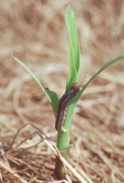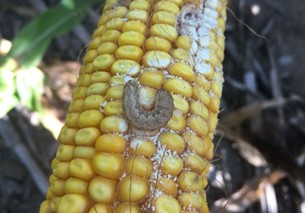AGRONOMIC RESOURCESTO SUPPORT EVERY SEASON
YOU CAN TAKETO THE FIELD
Controlling Mid-Season Corn Pests
What to look out for
As mid-summer approaches and the growing season continues, scouting for corn pests in your fields should be a top priority. As you, or your field scout walks your corn fields, make sure both the True Armyworm and Western Bean Cutworm are at the top of your scouting lists.
True Armyworm

The life cycle of the Armyworm begins in April to May, when adults of the first generation emerge from the soil to lay their eggs. As larvae begin to hatch and feeding occurs, be looking for a ragged appearance on the outer edge of the leaf towards the midrib when scouting your fields. This is an indicator that Armyworms are present.
Adult True Armyworm moths are more likely to be present in fields that have ground cover (such as fields that are cover cropped or filled with grassy weeds). If your fields have been planted with a cover crop or are no-till, begin scouting for Armyworms in May and June.
Feeding tends to occur during the night, allowing Armyworms to hide under the soil or residue during the day- making it harder to find your crop damage culprit. If feeding is not caught in the beginning of the season, you will begin seeing complete lower leaf removal, leading to upper leaf feeding and total plant defoliation.
Western Bean Cutworm

The life cycle of the Western Bean Cutworm begins near the end of June to early July when their moths emerge from the soil and migrate to the upper surface of corn leaves to lay their eggs.
Eggs generally hatch near the time of corn pollination and will move to the base of the plant to feed. Feeding occurs on the pollen found on tassels that are developing in the flag leaf. If the corn has already tasseled, the larvae will instead feed on the silks- leading to poor pollination if feeding continues through pollen shed.
If feeding occurs, wounds opened by WBC create opportunities for ear molds such as Diplodia and Fusarium to set in, creating potential yield loss throughout your field.
When considering how to deal with Western Bean Cutworm and True Armyworm, look to LG Seeds for corn seed that offers Trecepta or Viptera traits that exhibit control over these pests.
For more information about preventing and controlling corn pests, reach out to your LG Seeds representative.





